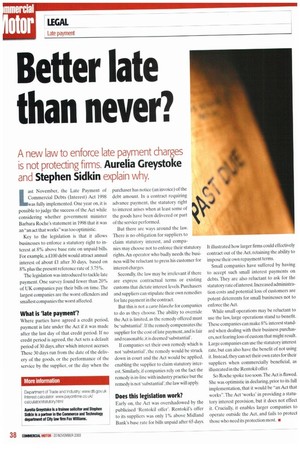Better late than never?
Page 38

If you've noticed an error in this article please click here to report it so we can fix it.
A new law to enforce late payment charges
is not protecting firms. Aurelia Greystoke and Stephen Sidkin explain why.
Last November, the Late Payment of Commercial Debts (Interest) Act 1998 as fully implemented. One year on, it is possible to judge the success of the Act while considering whether government minister Barbara Roche's statement in 1998 that it was an "an act that workswas too optimistic.
Key to the legislation is that it allows businesses to enforce a statutory right to interest at 8% above base rate on unpaid bills. For example. a /100 debt would attract annual interest of about il after 30 days, based on 8% plus the present reference rate of 3.75%.
The legislation was introduced to tackle late payment. One survey found fewer than 20% of UK companies pay their bills on time. The largest companies are the worst offenders and smallest companies the worst affected.
What is 'late payment'?
Where parties have agreed a credit period, payment is late under the Act if it was made after the last day of that credit period. If no credit period is agreed, the Act sets a default period of 30 days, after which interest accrues. These 30 days run from the date of the delivery of the goods, or the performance of the service by the supplier, or the day when the purchaser has notice (an invoice) of the debt amount. In a contract requiring advance payment. the statutory right to interest arises when at least some of the goods have been delivered or part of the service performed.
But there are ways around the la■A There is no obligation for suppliers to claim statutory interest, and companies may choose not to enforce their statutory rights. An operator who badly needs the business will be reluctant to press his customer for interest charges.
Secondly, the law may be irrelevant if there are express contractual terms or existing customs that dictate interest levels. Purchasers and suppliers can stipulate their own remedies for late payment in the contract.
But this is not a carte blanche for companies to do as they choose. The ability to override the Act is limited, as the remedy offered must be 'substantial'. If the remedy compensates the supplier for the cost of late payment,and is fair and reasonable, it is deemed 'substantial'.
If companies set their own remedy which is not 'substantial', the remedy would be struck down in court and the Act would be applied, enabling the supplier to claim statutory interest. Similarly. if companies rely on the fact the remedy is in-line with industry practice but the remedy is not 'substantial', the law will apply.
Does this legislation work?
Early on, the Act was overshadowed by the publicised 'Rentokil offer'. Rentokil's offer to its suppliers was only 1% above Midland Bank's base rate for bills unpaid after 65 days.
It illustrated how larger firms could effectively contract out of the Act, retaining the ability to impose their own repayment terms.
Small companies have suffered by having to accept such small interest payments on debts. They are also reluctant to ask for the statutory rate of interest. Increased administration costs and potential loss of customers are potent deterrents for small businesses not to enforce the Act.
While small operations may be reluctant to use the law, large operations stand to benefit. These companies can make 8% interest standard when dealing with their business purchasers, not fearing loss of custom that might result. Large companies can use the statutory interest rate, but can also have the benefit of not using it. Instead, they can set their own rates for their suppliers when commercially beneficial, as illustrated in the Rentokil offer.
So Roche spoke too soon.The Act is flawed. She was optimistic in declaring, prior to its full implementation, that it would be -an Act that works". The Act 'works' in providing a statutory interest provision, but it does not effect it. Crucially, it enables larger companies to operate outside the Act, and fails to protect those who need its protection most. ei
































































































































































































